PRINCETON, NJ -- The majority of Americans do not believe President Barack Obama deserved to win the Nobel Peace Prize (61%), but the public is split in its personal reaction to the announcement. Asked if they are "glad" Obama received the prize, 46% of Americans say yes and 47% say no.
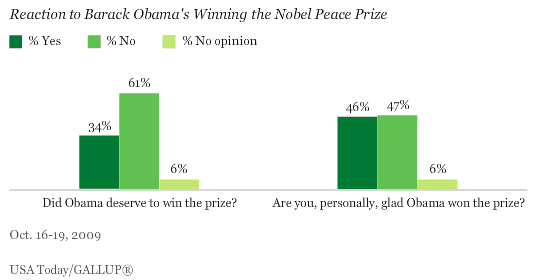
"Not surprisingly, reaction to the awarding of the prize is partisan, although support for Obama's receiving the prize among Democrats is perhaps not as large as might be expected."
The Norwegian Nobel Committee's Oct. 9 announcement that President Obama had received the 2009 Nobel Peace Prize caught the world by surprise. One Associated Press report on the day of the announcement was headlined, "Gasps as Obama Awarded Peace Prize." Those startled by the announcement apparently included Obama himself, who said he was "surprised and deeply humbled" by the award. Obama appeared to recognize that the award was based more on the promise of his new administration than on its still-nascent record of accomplishments, saying, "Let me be clear: I do not view it as a recognition of my own accomplishments, but rather as an affirmation of American leadership on behalf of aspirations held by people in all nations." He went on to say, "To be honest, I do not feel that I deserve to be in the company of so many of the transformative figures who've been honored by this prize."
The USA Today/���۴�ýpoll conducted about a week after the announcement did not ask Americans whether they believe that the award may ultimately be deserved, or whether it was appropriately given in anticipation of the potential of the Obama administration's peace efforts. The central question simply asked whether Obama "deserved" the award, and found Americans by roughly a 2-to-1 margin saying no rather than yes.
Not surprisingly, reaction to the awarding of the prize is partisan, although support for Obama's receiving the prize among Democrats is perhaps not as large as might be expected. Fifty-nine percent of Democrats say the award is deserved, which can be contrasted with the 84% of Democrats who in the same survey approve of Obama's job performance. Independents and, in particular, Republicans are highly likely to say Obama did not deserve to win the prize.
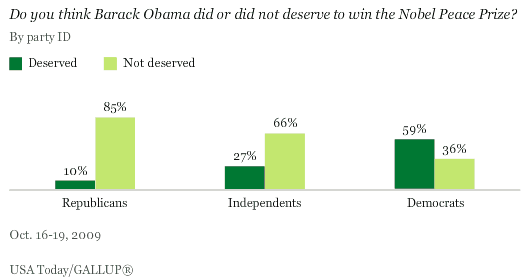
Emotional reactions to the award ("glad" versus "not glad") are somewhat more positive than perceptions of whether Obama deserved the award, across each of the three partisan groups. Seventy-six percent of Democrats are glad Obama received the award, as are 38% of independents and 21% of Republicans.
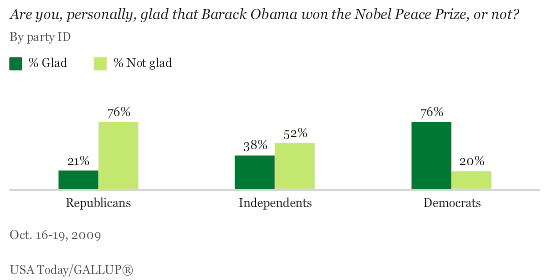
There is a general and expected consistency between belief that Obama deserved the prize and being personally glad that he won. Three-quarters of Americans have either positive reactions to both of these questions or negative reactions to both.
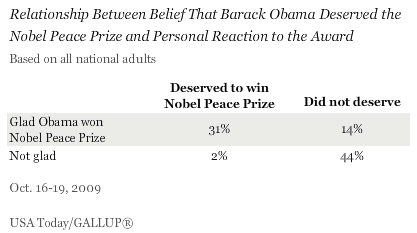
Among the two discordant groups, the larger consists of the 14% who say Obama did not deserve the award but at the same time are personally glad that he won. A very small 2% say he deserved the award but were not personally glad.
About a third of Americans who approve of the job Obama is doing as president in the Oct. 16-19 survey also say the Nobel award was not deserved. This suggests that some of the "undeserved" reaction to the award is based not on an overall negative opinion of Obama's job performance, but rather on a nuanced view that positive current performance is different than a body of work deserving of a Nobel Prize.
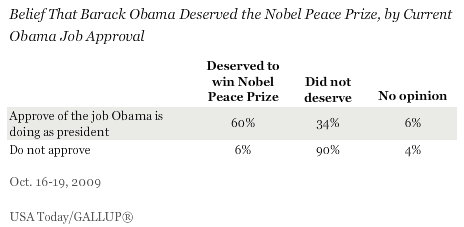
Bottom Line
Commentators in the U.S. and abroad have evinced widely varied reactions to the unusual choice of an American president in office for less than nine months as the recipient of this year's Nobel Peace Prize. The Nobel Peace Prize committee itself put more emphasis in its announcement on hope for the future than on Obama's actual accomplishments to date, lauding Obama's "vision," saying he has given the world "hope for a better future," and that he has created "a new climate in international politics." The current poll results, however, suggest that at least some rank-and-file Americans may be oriented more toward accomplishments rather than promise for the future.
Of note are the findings that a sizable group of those who approve of Obama's job performance and of Democrats say Obama did not deserve the Nobel Peace Prize. This suggests that the more negative responses to the awarding of the prize for some are not simply knee-jerk reactions to a disliked president, but rather more carefully thought-out reactions to the particular circumstances of the awarding of the prize.
Survey Methods
Results are based on telephone interviews with 1,521 national adults, aged 18 and older, conducted Oct. 16-19, 2009. For results based on the total sample of national adults, one can say with 95% confidence that the maximum margin of sampling error is ±3 percentage points.
Interviews are conducted with respondents on land-line telephones (for respondents with a land-line telephone) and cellular phones (for respondents who are cell-phone only).
In addition to sampling error, question wording and practical difficulties in conducting surveys can introduce error or bias into the findings of public opinion polls.
